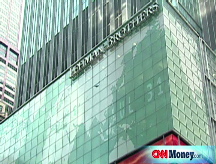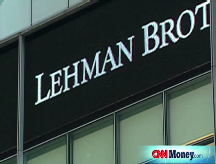The next bubble: pessimism
Yes, the banking industry is a mess. But with so many short sellers targeting the entire financial sector, this is starting to look like a bubble in reverse.

NEW YORK (CNNMoney.com) -- Tulips. Internet stocks. Real estate. Commodities. What do all of these have in common? If you said that they were all bubbles, congratulations.
So what's the next bubble? It may just be in short-selling. That may seem like an odd concept since bubbles are usually associated with assets inflating in value (before they go pop and the values sink fast).
But this may be a "negative bubble." Instead of a state of booming activity ending in a sudden collapse, we may eventually have a state of collapsing activity ending in a sudden boom.
These days, it seems that everybody wants to become a short seller. Faced with one scary headline after another, individuals are increasingly becoming more bearish.
Kim Hillyer, spokesperson with online brokerage TD Ameritrade (AMTD), said that short selling activity at the firm's approximately 7 million accounts has increased 16% in the past week.
Hillyer said that there has also been a large increase in program trading, automatic, computer-driven trades that can often exacerbate a sell-off.
And you can definitely see that playing out with financial stocks. Simply put, investors are treating all banks as if they deserve to be on the FDIC's problem list.
Short interest, the number of shares borrowed by investors that have been sold short but not yet repurchased, has surged for many banks over the past few months.
Investors aren't discriminating. For example, the level of short interest in Washington Mutual (WM, Fortune 500) and Wachovia (WB, Fortune 500), two battered banks that have been losing money, has shot up 98% and 123% respectively since mid-May.
But short interest in two banks that are routinely cited by analysts as having healthy balance sheets, Wells Fargo (WFC, Fortune 500) and US Bancorp (USB, Fortune 500), are up 42% and 161% over the same period.
"The market has not figured out who's truly troubled and who's not. There are some firms that are really in trouble and have a lot of exposure to housing. But there are some high-quality banks that will take a one-time hit and ultimately be fine," said Jason Tyler, senior vice president and director of research operations with Ariel Capital Management, an institutional investment firm in Chicago.
Tyler said that two banks he thinks are being unfairly punished because of fears about the financial sector are Beverly Hills-based City National (CYN), which has strong ties to the entertainment industry, and PrivateBancorp (PVTB), a bank in Chicago that focuses mainly on businesses and wealthy individuals.
These days though, it's short first and ask questions later. If you're a bank, you must have some bad loan skeletons in your closet. And the more that a bank's stock goes down, the harder it gets for that bank to do business since it can lose the confidence of investors, trading partners and customers.
"What I hear and see is that people are making money by simply picking out individual financial firms and shorting them. There is a negative bubble in attitudes." said David Kelly, chief market strategist with JPMorgan Funds. "But if enough people say bad things at the same time they can make it reality."
It's the exact opposite of the late 1990s when most investors thought tech stocks could go up and up forever and anyone who suggested otherwise was thought to be nothing more than a disgruntled bear ticked off about all the money they didn't make buying Amazon.com.
Now pessimism is breeding more pessimism. People are starting to think that it will never get better and can only get worse and those brave few who try to rationally point out that it's not the end of the world get branded as foolish optimists who are probably angry about the money they've lost by buying bank stocks.
To be sure, there are plenty of financial firms that are in serious trouble and the drops in their stock prices are probably justified.
The future of Lehman Brothers is highly questionable and the government's takeover of Fannie Mae and Freddie Mac pretty much makes those stocks worthless. Ariel's Tyler said there will be another significant wave of writedowns for banks due to the housing problem.
And don't mistake this column as a criticism of the concept of short selling. Professional shorts serve a valuable purpose to the market by finding stocks that have been propped up on too much hype and questionable accounting practices.
In fact, I think the SEC's recent crackdown on short selling of specific financial stocks is misguided and does not make sense in what is supposed to be a free market.
All that said, the skepticism about the financial sector, markets and economy is now so extreme that you can't help think it is a bubble.
"In twenty years, I've never seen a time where so many people are dismissive of economic numbers," Kelly said.
The conventional wisdom now is that the sky is falling, just as it was a few years ago that home prices would keep skyrocketing ad infinitum. That obviously turned out to be wrong.
The greater fool theory can work in reverse. Investors that keep shorting bank stocks thinking that there's nowhere to go but down may find themselves getting squeezed once the panic subsides.
"With some banks, people are going to look back years from now and kick themselves for not buying them at these prices. There are great opportunities if you do your homework," Tyler said. ![]()




